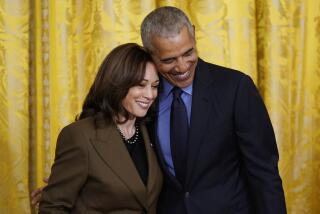Pan-African Crusader Still Ready for Revolution
HAVANA â His hair is going gray and his body is fighting cancer.
But when Kwame Ture, once widely in the news as black activist Stokely Carmichael, reaches across his hospital bed for the telephone, he answers it as always: âReady for revolution.â
A central figure in the United Statesâ black power movement of the 1960s and a crusader for pan-Africanism since, Ture came to Cuba in April for treatment of prostate cancer discovered in January.
Ture, whose name is pronounced KWAH-may tour-Ray, said he first felt leg pains in November while home in the West African country of Guinea and took medicine for the pain.
When the pains became more severe, he visited Dr. Barbara Justice during a trip to New York and wound up spending nearly a month undergoing treatment at Columbia-Presbyterian Hospital.
Smiling frequently, often laughing, Ture seemed as upbeat and polemical as ever during an hourlong interview at the Cira-Garcia clinic in Havana.
âActually, I live on borrowed time,â he said. â . . . In my job, death is an occupational hazard. So whether itâs a bullet, whether itâs cancer, makes no difference.â
He came to Cuba for care because âIâm a socialist,â he said.
âCuba does have excellent health care. As a socialist, I must be consistent. I cannot attack capitalism and attack an entire system and when I get sick run to capitalism and ask them to patch me up.â
Ture, 54, has responded well to treatment, said Justice, who accompanied him to Cuba. She said the tumor, and sites to which the cancer had spread, seem to be regressing, âso weâre quite optimistic at this point.â
Ture said Justice, a cancer specialist, accompanied him without pay. It is one sign of the regard with which he is held in much of the black community in the U.S.
âHe is a living legend, a hero who has dedicated his life to the liberation of African people worldwide, and itâs very important that we, the members of the community, support him in the same way he has supported us,â Justice said.
Ture said he has also received financial help for his treatment from the Nation of Islam, led by Louis Farrakhan.
In the 1960s, the Trinidad native then known as Stokely Carmichael led the Student Nonviolent Coordinating Committee. He participated in some of the first U.S. civil rights sit-ins and freedom rides, was repeatedly arrested and became a national figure leading a group that challenged the credentials of the official Mississippi delegation to the 1964 Democratic convention.
Growing more frustrated with the American system, he became prime minister of the Black Panther Party, then embraced pan-Africanism and in late 1968 moved to Guinea.
He founded the All-African Peopleâs Revolutionary Party under his new name, taken from African leaders Kwame Nkrumah and Ahmed Sekou Ture.
Ture said he hopes to see a single, socialist state for all of Africa, which would give Africans there and abroad--he rejects the term âAfrican Americanâ--pride and power.
âFor us, once Africa is unified and strong, the problem will be solved because Africans will be respected wherever they are. And if theyâre not, they can just get up and go home,â he said.
The state that comes closest to his vision, he said, may be Libya, led by Moammar Gadhafi.
Ture defines himself as a revolutionary. âRevolution is the continual and constant qualitative change of humanity. Thatâs all it is.â
That doesnât require outright war, he said, pointing to the end of legal segregation in the U.S. as a revolutionary step.
But Ture seems to delight in warning of violence.
âWe are still the only people who create urban rebellions in America, without planning,â he said. âYou know whatâs going to happen when we plan it?â he added with a chuckle. âIt will be planned, of course.â
Ture said he sees progress for some American blacks--but also growing poverty.
âThe number of [black] congress people has increased, the number of newspaper commentators, the number of basketball players. Put that in there,â he added with a grin, âbecause they think they got there without their peopleâs struggle.â
Also growing among American blacks is a consciousness of oppression, he said. He cited community efforts to combat drugs, the rise in interest in Africa and the big turnout for the Million Man March organized by Farrakhan.
âThe people are ready for our struggle,â he said. âWorsening conditions and rising consciousness must lead to revolution, and I am a revolutionary. So for me, everything is going well.â
Ture said a lack of organization and petty quarrels had diluted black political power at a national level in the U.S., but predicted that would change.
âAmerica and capitalism itself is pushing us to revolution. If I shed my blood for the vote to reform something and I donât get anywhere, I might as well shed my blood for revolution, overthrow the whole d--- system. Letâs get it on. Makes sense to me. Iâm shedding my blood anyway; I might as well shed it for victory.â
More to Read
Sign up for Essential California
The most important California stories and recommendations in your inbox every morning.
You may occasionally receive promotional content from the Los Angeles Times.










